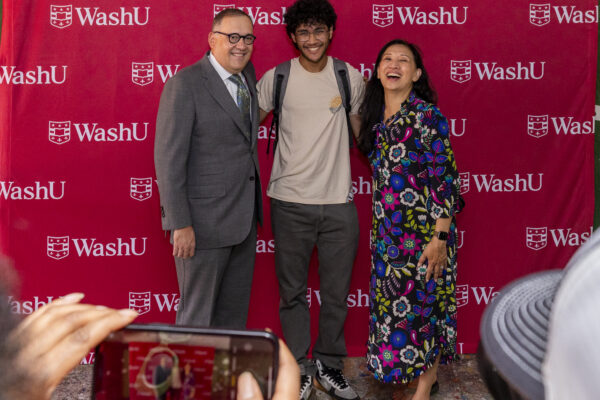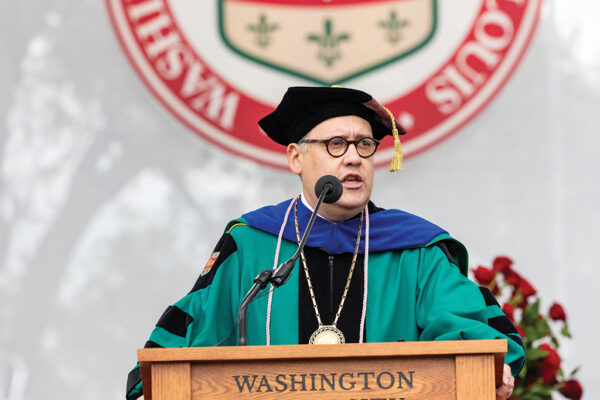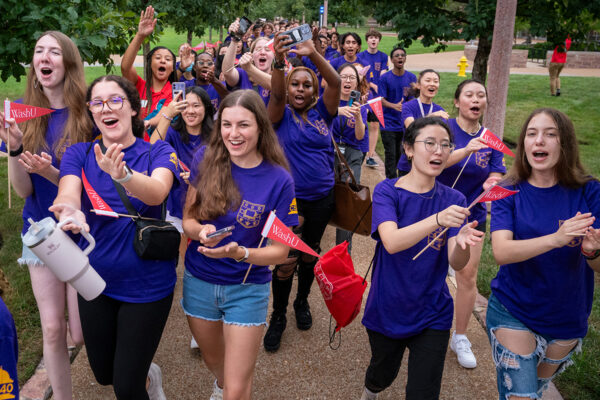Over the last decade, WashU has become a national leader in promoting equitable access to a world-class education. We have made financial aid a top priority because we consider it an ethical responsibility. Inscribed in Latin on the facade of Brookings Hall are the words “If you wish to learn, enter: We welcome you,” and we really mean it. The fulfillment of our mission will require us to build a community of excellence based on merit, one in which all qualified students have the freedom to pursue a life-changing education, unhindered by financial circumstances.
Driven by this core conviction, we invested a record $1 billion in financial aid in fall 2021. We experienced a financial windfall that year, resulting from an extraordinary and unprecedented return on our endowment. This allowed us to implement a need-blind undergraduate admissions policy and significantly augment funding for graduate scholarships and fellowships as part of an initiative called Gateway to Success.
In fall 2022, we publicly launched Make Way: Our Student Initiative, a major universitywide fundraising effort for scholarships and a best-in-class student experience. The name “Make Way” signals the need to clear a path, to remove financial obstacles for all talented and motivated students, irrespective of socioeconomic status. Our dedicated and generous university community has rallied behind the initiative. Since January 2019, alumni, parents, and friends have established 263 new undergraduate and graduate endowed scholarships.
With faith in the strength of WashU’s private philanthropic partnerships, we have continued to expand our institutional financial commitments to students, including, most recently, our move to a no-loan undergraduate financial aid policy. This policy, which went into effect in fall 2024, replaces need-based loans in undergraduates’ financial aid packages with scholarships and university grants, alleviating the burden of student debt.
Meanwhile, our graduate schools have made their own leaps toward the ideal of educational equity. In fall 2019, our medical school committed $100 million to bolster financial aid resources for students pursuing medical degrees. As of January 2023, 59% of our MD students received full-tuition scholarships, while 29% received partial-tuition aid. In fall 2023, our law school went tuition free for low-income students studying for a JD.
“As we celebrate these advancements, we recognize there is still significant work ahead to fulfill our commitment. Our resources are great, but the need is still greater.”
Chancellor Martin
As we celebrate these advancements, we recognize there is still significant work ahead to fulfill our commitment. Our resources are great, but the need is still greater. Just to sustain the no-loan policy in perpetuity, we must bolster our endowment resources for scholarships in a big way: $325 million for endowed undergraduate scholarships by June 2028.
Today, more than half of our financial assistance for students comes from our operating budget. This constrains our ability to carry out the university’s other strategic priorities — amazing endeavors like creating novel cancer treatments and discovering breakthrough environmental solutions. Equally important, it limits our capacity to bolster existing programs and research. In the long term, this approach hampers our ability to compete with our peer institutions.
Looking to the future, we will prioritize our tried-and-true financial model that emphasizes proactive philanthropic partnership alongside the deliberate and steady growth of our endowment. This approach will allow us to simultaneously expand access and student support while sustaining WashU’s excellence as a hub for transformative solutions to some of the world’s most pressing problems.
I know and trust in the strength of our WashU connections. Our community has long exhibited a mutual sense of obligation to pay forward the university’s life-changing opportunities to future generations of students. This ethos will carry us far in meeting our profound, ongoing need for generous philanthropic investment. But our impulse to give back also transcends duty. It stems from a place of warmth and enthusiasm. I challenge you: What WashU experiences and memories kindle those feelings in you? How might they light a fire for future impact?



